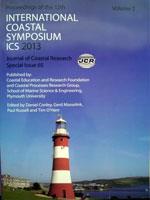Appeaning Addo, K., 2013. Assessing Coastal Vulnerability Index to Climate Change: the Case of Accra – Ghana
Coastal zones are under severe threat from climate change and its associated sea-level rise. Areas with relatively low elevations will experience either temporal or permanent flooding, while other areas will experience increased coastal erosion. Several factors within the coastal environment combine to drive coastal erosion. Identifying these variables and quantifying their risk levels enable the vulnerability index of a particular location to be estimated. This study divided the coast of Accra into three sections based on the geomorphology. The vulnerability index was estimated for the three sections by determining their relative risk factors. The ‘square root of product mean' (CVI5) method was adopted for this study. The results indicate that the coastal vulnerability index for the entire coast of Accra is 7.7, which falls within the moderate risk category. The western section is more vulnerable to sea-level rise followed by the eastern and the central sections. Inundation in the western section will result in displacement of the local population, destroy their source of livelihood and flood the Densu wetlands – a RAMSAR site.





